Summer heat safety tips
Posted in General Health & Wellness on April 26, 2011 by NebraskaHealth.com staff. Last modified on April 21, 2019. Read disclaimer.
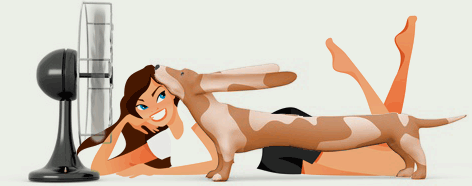
+ Free Shipping & Returns on Eligible Items.
(*Amazon's Top 100 list updated hourly.)
In some parts of the country, it's starting to cool down in the evening and the days are becoming more bearable. But in the South and Midwest, temperatures are still climbing into the 90's on a regular basis, and the sun's rays can still be punishing -- both in terms of skin damage and raising body temperature. According to the Centers for Disease Control and Prevention (CDC) over 600 people die in an average year from heat-related illnesses -- making heat the #1 weather-related killer in the US. While extreme temperatures place the very young and very old at the greatest risk, heat exhaustion and heat stroke can affect people of all ages.
Consider, for example, what happened to 34 year old actor-comedian Martin Lawrence during a hot spell in California recently. After piling on some extra clothes, Lawrence went jogging in the summer heat and very nearly died of heatstroke. He collapsed in front of his home and lapsed into a coma. Paramedics recorded his temperature at 107 degrees Fahrenheit and immediately rushed him to the Emergency Room where he was treated for acute hyperthermia.
Lawrence, who jogs every day, was apparently trying to lose some weight for an upcoming movie role but nearly lost his life instead. After four days, he came out of the heatstroke-induced coma, and doctors were encouraged that he would not need kidney dialysis as earlier feared. He is expected to recover.
While young actors are not normally on the list, those at greatest risk for heat-related illnesses include the homebound elderly -- especially those without air conditioning or fans (nearly 70% of heat deaths occur indoors); people whose jobs keep them outdoors; people who take certain drugs (e.g., some tranquilizers, antidepressants or antihistamines, as well as some drugs used to treat Parkinson's Disease); infants; those who are overweight; and the chronically ill.
According to the National Disaster Education Coalition, the duration of excessive heat (often combined with humidity) is directly related to the number of people affected by heat-related illnesses(1), with the highest impact occurring when the heat lasts more than two days. An extreme heat watch, by the Coalition's definition, is when temperatures are 10 or more degrees above the average high temperature for the region, last for prolonged periods of time, and are accompanied by high humidity. (Sounds like Nebraska in July, August, and often September.)
The three dangerous stages of heat emergencies/illnesses: Heat Cramps, Heat Exhaustion and Heat Stroke
A heat wave is no joking matter. When the body cannot cool itself or is overwhelmed by the heat, symptoms may progress rapidly and -- if not properly treated at once -- advance to a potentially life-threatening condition as it did for the young actor. Under normal circumstances, a person's body temperature is kept under control by perspiration and evaporation on the skin. When this system breaks down or is overwhelmed, a wide range of symptoms can occur, starting with heat cramps. Athletes training in summer months often experience episodes of cramping if they sweat profusely or don't take in enough fluids and salt. The cramping is usually relieved by resting in a cool place, fluid (water) replacement, and eating salty foods since sodium and potassium are lost when we sweat. (But do NOT take salt tablets unless instructed to do so by a doctor.)
What are the best beverages for hydration?
Avoid alcohol or drinks with caffeine (coffee, sodas or tea) or high levels of sugar (sodas or fruit juices) which act as diuretics. (Because they cause us to urinate more, they can actually increase our risk of dehydration.)
If you're generally in good health* and won't be sweating or out in the sun for very long, then cool, fresh water is the perfect drink for preventing dehydration.
Otherwise, if you'll be extremely active in the hot weather, you may need to start replacing sodium and other electrolytes to maintain normal fluid balance and nerve, organ and muscle function. Drinks like Pedialyte, Gatorade and Powerade are all rich in electrolytes. (Note: drinking excessive amounts of pure water also has the potential to dilute your salt and other electrolytes to dangerously low levels.)
So, how much should we drink to stay hydrated?
The answer is... it varies. In addition to the temperature, a person's age, sex, activity level and overall health are also factors.
One good rule of thumb is to drink water whenever you're thirsty. Another tip is to monitor the color of your urine. Pale, yellow urine that resembles lemonade is normal. Dark urine is an indicator of dehydration while clear urine suggests that you may be overhydrated.
Early intervention is the key to preventing dehydration! The American College of Sports Medicine offers these general recommends:
- prepare by drinking 2-3 cups an hour or two BEFORE your outdoor activity.
- drink 1-2 cups every 10-15 minutes during your activity.
- drink 2-3 cups AFTER your activity to replace fluids you've lost.
If you want to get even more scientific about how much you should be drinking, a person can weigh themselves before and after their activity or work day. Then, sip on 2-3 cups of water (24 oz.) for each pound lost.
* People who are ill and running a fever, vomiting or experiencing diarrhea are at especially high risk for dehydration... as are those with diabetes due to frequent urination.
An even more serious heat-related illness -- heat exhaustion -- can come on very quickly. In addition to an elevated body temperature and possible muscle cramps, an affected person might experience a rapid heartbeat, feel lightheaded or headache, nauseated, and cold and clammy to the touch, and suddenly become pale. Prompt response is mandatory to prevent heatstroke. The important thing is to bring down the body temperature as fast as possible. Get the person to a cool area at once, lay them down after loosening their clothing, apply a cool cloth to their face, neck and wrists, and elevate their legs. Have them drink cool (not cold) water or an electrolyte-containing beverage, and watch them carefully. They should begin to feel better with their temperature coming down within a half hour.
If a heat victim does not respond to preliminary first aid efforts, get emergency help immediately. If their temperature climbs to 105 F, and their skin becomes hot and dry time is really of the essence. Other symptoms of heat stroke include rapid heartbeat, shallow breathing, dramatic shifts in blood pressure -- up or down -- and a sense of confusion. While waiting for the emergency team, get the victim to the coolest area possible, begin sponging them down with cool water, or place them in front of a fan. If the victim refuses water or is vomiting, or if they should lose consciousness, do not give them anything to eat or drink.
Anyone who has lived through a Midwest summer soon develops some common sense ways to avoid heat-related illnesses:
Even if your home is not air conditioned, you can usually find places to go to get out of the heat. Visit shopping malls, libraries and other air conditioned community facilities.
Check on any homebound elderly neighbors or family members during a heat wave.
Listen to your body and take it easy in the heat. If possible, run errands and enjoy your outdoor time in the late afternoons and evenings.
Dress appropriately. Wear light, thin clothing and keep your skin covered or shaded as much as possible to prevent sunburns.
Eat light. Vegetables are easier to digest and tend to contain more liquid than meats and other protein-rich foods.
If your car has been sitting in the sun, try opening the doors, turning on the ignition and air conditioning, and waiting for a few minutes before you get in. Experts point out that temperature inside a closed vehicle can reach over 140 degrees F within minutes and the sudden shock of getting into this super-heated air can raise your body temperature in a hurry. Never leave children or pets in closed vehicles…ever; exposure to these extreme temperatures can kill in minutes.
Summer heat safety tips for pets
Since dogs and cats don't sweat like us, they are less efficient than we are at staying cool. The following tips, however, can help keep pets comfortable and healthy in summer:
Be careful to not stress or over-exercise animals in the summer heat.
Pets' fur can be trimmed back but dogs and cats should never be shaved down to the skin. A dog's fur actually helps prevent overheating and protects against sunburn. Brushing more regularly works well for cats.
Like us, pets can easily become dehydrated so make certain they have fresh water available to drink at all times.
Pets need shade from the sun and a way to stay off of hot concrete or asphalt. Since they are so close to the ground, they get even more of the radiating heat and their paws can burn.
Never, ever, leave pets in a car on a warm day -- even if it's cloudy!
Older, overweight or ill pets are at especially high risk of overheating. And so are those with flat faces, such as Persian cats and pugs, since they may have difficulty panting.
If a pet is panting heavily or drooling -- or you think the heat will be dangerous, please bring pets indoors if you have air conditioning.
When it comes to heat-related illnesses, being careless or taking foolish chances could cost a life.
Sources:
1.Heat (Heat Wave) section at https://www.weather.gov/media/bis/AmericanRedCross_TalkingAboutDisaster.pdf
2. yourfamilyshealth.com: It's Hot Out There
 Most Popular Topics in This Article:
Most Popular Topics in This Article:
 Feeling blah? Boost your mood
Feeling blah? Boost your mood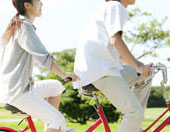 Tips for making fitness fun
Tips for making fitness fun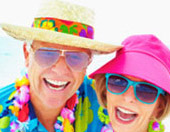 Preparing for retirement
Preparing for retirement Summer heat safety tips
Summer heat safety tips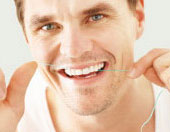 Keeping your teeth in tip-top shape
Keeping your teeth in tip-top shape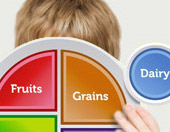 What are the nutritional needs of children?
What are the nutritional needs of children? Tips for preventing sunburns
Tips for preventing sunburns How to cook dried beans
How to cook dried beans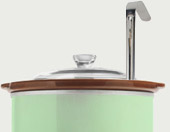 Slow cooking beans in a crock pot
Slow cooking beans in a crock pot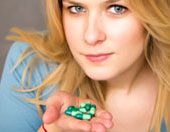 Medication safety tips
Medication safety tips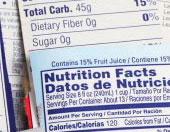 Why are food allergies becoming so common?
Why are food allergies becoming so common?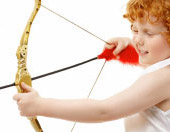 Foods associated with romance
Foods associated with romance